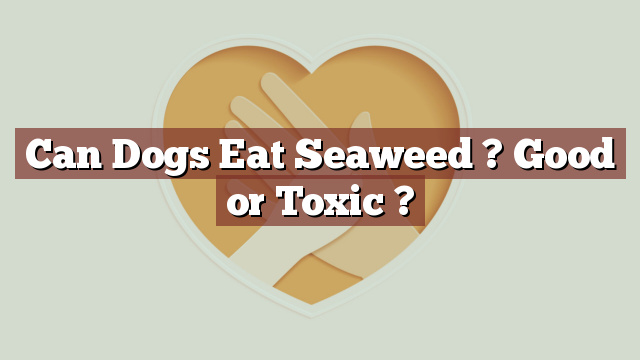Can Dogs Eat Seaweed? Good or Toxic?
When it comes to our furry friends, it’s crucial to be knowledgeable about what foods are safe for them to consume. Can dogs eat seaweed? This is a common question that many pet owners have. Seaweed is a type of marine algae that has gained popularity due to its potential health benefits for humans. However, before sharing this food with our canine companions, it’s essential to understand if it is safe or toxic for them.
Nutritional Value of Seaweed: What Does it Offer to Dogs?
Seaweed is known to be rich in various nutrients that are beneficial to human health. But what about dogs? Seaweed contains essential vitamins and minerals such as iodine, iron, calcium, and potassium. Additionally, it is a good source of antioxidants and dietary fiber. These components can potentially contribute to a healthy diet for our pets.
Is Seaweed Safe or Toxic for Dogs? Expert Opinions and Studies
According to veterinary experts, small amounts of seaweed are generally considered safe for dogs to consume. However, it’s important to exercise caution and avoid overfeeding them with this marine vegetation. Some types of seaweed, such as kelp, are specifically recommended by veterinarians as a supplement to support dogs’ thyroid health.
That being said, there are certain types of seaweed that can be harmful to dogs. Some species may contain a high level of salt, which can lead to sodium poisoning. Moreover, seaweed found on beaches or in coastal areas may have been exposed to toxins or bacteria, posing a potential risk to dogs if ingested.
Potential Risks or Benefits of Dogs Consuming Seaweed
While seaweed can offer health benefits to dogs, it’s essential to be aware of potential risks. Excessive consumption of seaweed can lead to gastrointestinal issues in dogs, including vomiting and diarrhea. Additionally, the iodine content in certain seaweed types can cause thyroid problems if consumed in large quantities. Therefore, it is crucial to ensure moderation and consult with a veterinarian before introducing seaweed into your dog’s diet.
On the other hand, the dietary fiber found in seaweed can aid in digestion and promote a healthy gut. The antioxidants present in seaweed may also have anti-inflammatory properties, potentially benefiting dogs with certain health conditions. However, further research is needed to fully understand the extent of these benefits and their specific applications to dogs.
What to Do If Your Dog Eats Seaweed: Steps to Ensure Safety
If your dog accidentally consumes seaweed, it is important to monitor their behavior and watch for any signs of distress. Mild cases may not require immediate action, but if your dog exhibits symptoms such as vomiting, diarrhea, or unusual behavior, it is crucial to seek veterinary advice promptly. The veterinarian will be able to provide appropriate guidance based on your dog’s health condition and the type of seaweed ingested.
Can Dogs Eat Seaweed? Conclusion: Making an Informed Decision
In conclusion, dogs can eat seaweed in moderation. Seaweed can provide some nutritional benefits to dogs, such as essential vitamins and minerals. However, it is essential to be cautious and avoid excessive consumption, as certain types of seaweed may contain high levels of salt or iodine, which can be harmful to dogs. If you are considering adding seaweed to your dog’s diet, it is advisable to consult with a veterinarian first to ensure the safety and well-being of your furry friend.
Thank you for investing your time in exploring [page_title] on Can-Eat.org. Our goal is to provide readers like you with thorough and reliable information about various dietary topics. Each article, including [page_title], stems from diligent research and a passion for understanding the nuances of our food choices. We believe that knowledge is a vital step towards making informed and healthy decisions. However, while "[page_title]" sheds light on its specific topic, it's crucial to remember that everyone's body reacts differently to foods and dietary changes. What might be beneficial for one person could have different effects on another. Before you consider integrating suggestions or insights from "[page_title]" into your diet, it's always wise to consult with a nutritionist or healthcare professional. Their specialized knowledge ensures that you're making choices best suited to your individual health needs. As you navigate [page_title], be mindful of potential allergies, intolerances, or unique dietary requirements you may have. No singular article can capture the vast diversity of human health, and individualized guidance is invaluable. The content provided in [page_title] serves as a general guide. It is not, by any means, a substitute for personalized medical or nutritional advice. Your health should always be the top priority, and professional guidance is the best path forward. In your journey towards a balanced and nutritious lifestyle, we hope that [page_title] serves as a helpful stepping stone. Remember, informed decisions lead to healthier outcomes. Thank you for trusting Can-Eat.org. Continue exploring, learning, and prioritizing your health. Cheers to a well-informed and healthier future!

